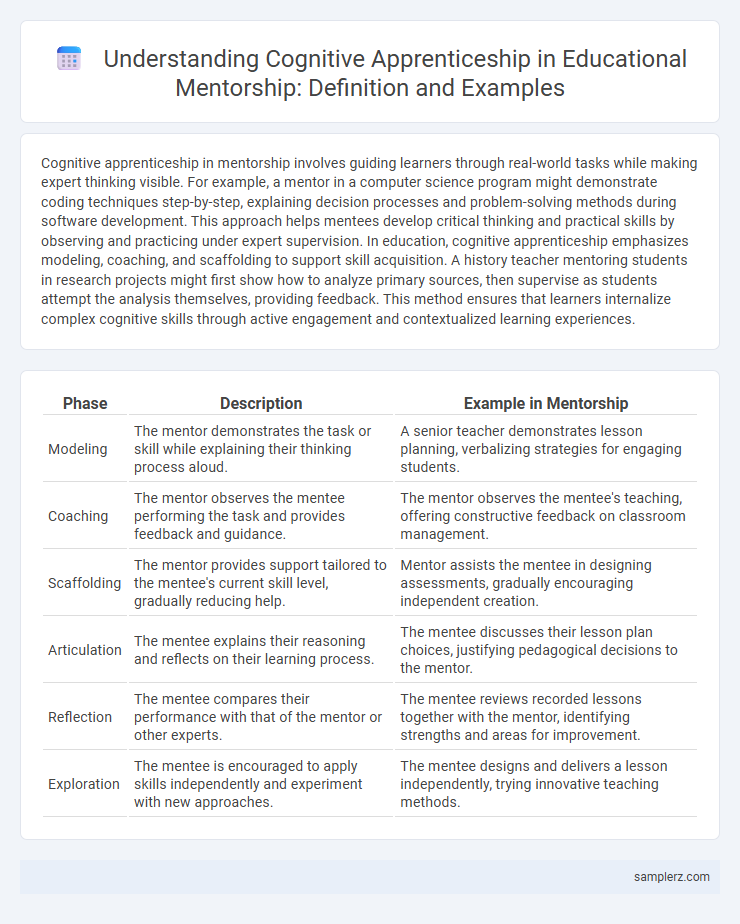Cognitive apprenticeship in mentorship involves guiding learners through real-world tasks while making expert thinking visible. For example, a mentor in a computer science program might demonstrate coding techniques step-by-step, explaining decision processes and problem-solving methods during software development. This approach helps mentees develop critical thinking and practical skills by observing and practicing under expert supervision. In education, cognitive apprenticeship emphasizes modeling, coaching, and scaffolding to support skill acquisition. A history teacher mentoring students in research projects might first show how to analyze primary sources, then supervise as students attempt the analysis themselves, providing feedback. This method ensures that learners internalize complex cognitive skills through active engagement and contextualized learning experiences.
Table of Comparison
| Phase | Description | Example in Mentorship |
|---|---|---|
| Modeling | The mentor demonstrates the task or skill while explaining their thinking process aloud. | A senior teacher demonstrates lesson planning, verbalizing strategies for engaging students. |
| Coaching | The mentor observes the mentee performing the task and provides feedback and guidance. | The mentor observes the mentee's teaching, offering constructive feedback on classroom management. |
| Scaffolding | The mentor provides support tailored to the mentee's current skill level, gradually reducing help. | Mentor assists the mentee in designing assessments, gradually encouraging independent creation. |
| Articulation | The mentee explains their reasoning and reflects on their learning process. | The mentee discusses their lesson plan choices, justifying pedagogical decisions to the mentor. |
| Reflection | The mentee compares their performance with that of the mentor or other experts. | The mentee reviews recorded lessons together with the mentor, identifying strengths and areas for improvement. |
| Exploration | The mentee is encouraged to apply skills independently and experiment with new approaches. | The mentee designs and delivers a lesson independently, trying innovative teaching methods. |
Understanding Cognitive Apprenticeship in Educational Mentorship
Cognitive apprenticeship in educational mentorship involves modeling expert thinking processes, coaching mentees through problem-solving tasks, and gradually increasing their responsibility to foster independent learning. This approach emphasizes authentic contexts where mentors demonstrate strategies, articulate reasoning, and provide scaffolding that supports mentees' cognitive development. By engaging in real-world educational challenges, mentees internalize critical skills and metacognitive strategies essential for effective teaching and learning.
Key Stages of Cognitive Apprenticeship for Mentors
Cognitive apprenticeship in mentorship involves modeling expert problem-solving skills, coaching mentees through guided practice, and gradually scaffolding tasks to promote independent mastery. Key stages include articulation, where mentors encourage verbalizing thought processes, reflection, allowing mentees to compare strategies and outcomes, and exploration, supporting self-directed learning and innovation. Effective implementation of these stages enhances mentee competence by integrating cognitive skills with real-world application.
Real-World Examples of Cognitive Apprenticeship in Schools
Cognitive apprenticeship in schools emerges through teachers modeling problem-solving strategies during complex math lessons, allowing students to observe expert thinking processes directly. In science labs, mentors guide students step-by-step in conducting experiments, gradually transferring responsibility to foster independent analytical skills. This hands-on approach bridges theoretical knowledge and practical application, enhancing deeper understanding and retention.
Modeling Thought Processes: Effective Mentorship Strategies
Effective mentorship in education exemplifies cognitive apprenticeship by explicitly modeling thought processes, allowing mentees to observe expert problem-solving strategies in real time. Mentors articulate their reasoning, decision-making, and reflective thinking during complex tasks, helping learners internalize cognitive strategies. This transparent demonstration of mental steps enhances critical thinking and promotes autonomous learning among students.
Scaffolding Techniques in Mentorship Programs
Mentorship programs often implement scaffolding techniques by providing structured guidance that gradually decreases as mentees gain competence, such as step-by-step problem-solving demonstrations and targeted feedback in real-time. These approaches align with cognitive apprenticeship principles by modeling expert thought processes and encouraging active practice within authentic tasks. Effective scaffolding fosters skill development and critical thinking, enhancing mentees' autonomy and confidence in complex learning environments.
Fading Support: Gradual Mentor Withdrawal for Student Independence
In cognitive apprenticeship, fading support involves mentors gradually reducing direct guidance to encourage student autonomy and problem-solving skills. For example, a mentor initially provides step-by-step modeling of a complex task, then slowly transitions to offering hints and prompts before allowing the mentee to work independently. This phased withdrawal enhances learner confidence and fosters critical thinking, essential for mastering intricate academic skills.
Encouraging Reflection in Academic Mentorship
Encouraging reflection in academic mentorship is a core practice of cognitive apprenticeship, where mentors guide mentees to critically analyze their learning experiences and problem-solving strategies. This reflective process enhances metacognitive skills, enabling students to better understand their thought patterns and improve academic performance. Regular reflective dialogue between mentor and mentee fosters deeper comprehension and promotes independent, self-regulated learning.
Collaborative Learning in Cognitive Apprenticeship
Collaborative learning in cognitive apprenticeship involves mentors and learners working together to solve complex problems, promoting shared knowledge construction and skill development. This approach enables apprentices to observe expert strategies, engage in guided practice, and receive immediate feedback, enhancing their cognitive and metacognitive abilities. Studies show that such collaborative experiences improve critical thinking and transfer of skills in educational settings.
Applying Cognitive Apprenticeship in Online Education
Applying cognitive apprenticeship in online education involves modeling expert thinking processes through video demonstrations and interactive problem-solving sessions. Mentors provide scaffolding by breaking down complex tasks into manageable steps, promoting guided discovery and reflection within virtual environments. This approach enhances learner engagement and deepens understanding by simulating real-world cognitive challenges in digital formats.
Success Stories: Transformative Outcomes of Cognitive Apprenticeship
Mentorship programs employing cognitive apprenticeship have demonstrated transformative outcomes, exemplified by a case where a novice teacher, guided through modeling and coached reflection, significantly improved student engagement and achievement over one academic year. In another success story, engineering apprenticeship integrated real-time problem-solving with expert feedback, resulting in a 40% increase in apprentice proficiency and project completion rates. These examples highlight how cognitive apprenticeship fosters deep learning and skill mastery through authentic, contextualized mentoring experiences.

example of cognitive apprenticeship in mentorship Infographic
 samplerz.com
samplerz.com